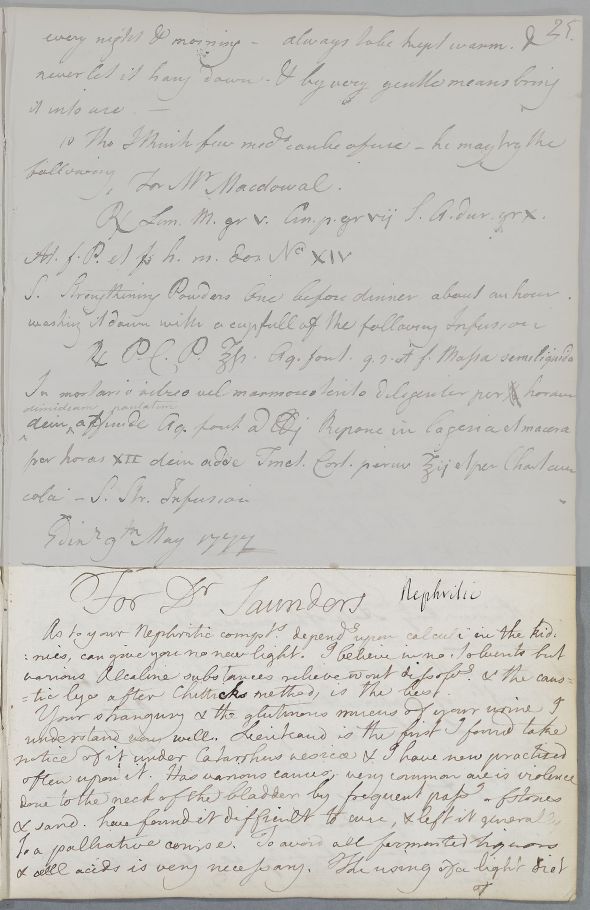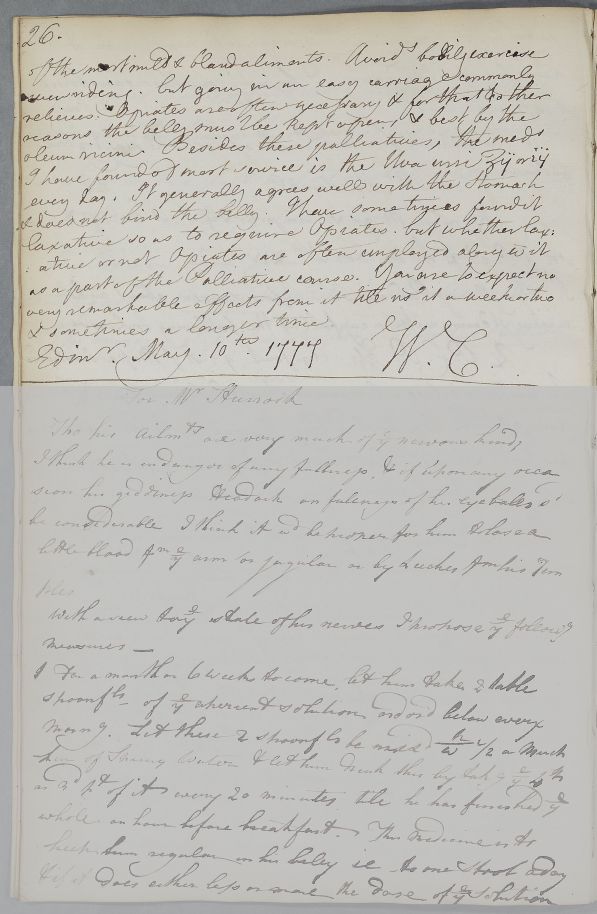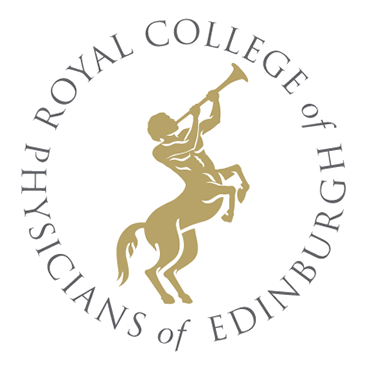
The Consultation Letters of Dr William Cullen (1710-1790) at the Royal College of Physicians of Edinburgh
[ID:4056] From: Dr William Cullen (Professor Cullen) / To: Dr James Kenneth Saunders / Regarding: Dr James Kenneth Saunders (Patient) / 10 May 1777 / (Outgoing)
Reply, 'For Dr Saunders', advising James Saunders on his own illness, which may be caused by kidney stones. Cullen refers to Lieutaud, and to Chittick's method of dissolving the stone.
- Facsimile
- Normalized Text
- Diplomatic Text
- Metadata
- Case
- People
- Places
Facsimile
There are 2 images for this document.

[Page 1]

[Page 2]
Metadata
| Field | Data |
|---|---|
| DOC ID | 4056 |
| RCPE Catalogue Number | CUL/1/1/9/29 |
| Main Language | English |
| Document Direction | Outgoing |
| Date | 10 May 1777 |
| Annotation | None |
| Type | Scribal copy ( includes Casebook Entry) |
| Enclosure(s) | No enclosure(s) |
| Autopsy | No |
| Recipe | No |
| Regimen | No |
| Letter of Introduction | No |
| Case Note | No |
| Summary | Reply, 'For Dr Saunders', advising James Saunders on his own illness, which may be caused by kidney stones. Cullen refers to Lieutaud, and to Chittick's method of dissolving the stone. |
| Manuscript Incomplete? | No |
| Evidence of Commercial Posting | No |
Case
Cases that this document belongs to:
| Case ID | Description | Num Docs |
|---|---|---|
| [Case ID:852] |
Case of Dr James Saunders, who had nephritis, had his son surgically remove a stone and now has a bladder problem. |
3 |
People linked to this document
| Person ID | Role in document | Person |
|---|---|---|
| [PERS ID:1] | Author | Dr William Cullen (Professor Cullen) |
| [PERS ID:596] | Addressee | Dr James Kenneth Saunders |
| [PERS ID:596] | Patient | Dr James Kenneth Saunders |
| [PERS ID:1] | Patient's Physician / Surgeon / Apothecary | Dr William Cullen (Professor Cullen) |
| [PERS ID:1201] | Other Physician / Surgeon | Dr Joseph Lieutaud |
| [PERS ID:1922] | Other Physician / Surgeon | Dr Walter Chittick |
Places linked to this document
| Role in document | Specific Place | Settlements / Areas | Region | Country | Global Region | Confidence |
|---|---|---|---|---|---|---|
| Place of Writing | Cullen's House / Mint Close | Edinburgh | Edinburgh and East | Scotland | Europe | certain |
| Destination of Letter | Banff (Bamf) | East Highlands | Scotland | Europe | inferred |
Normalized Text
For Dr Saunders
As to your Nephritic complaints depending upon calculi in the kid¬
nies, can give you no new light. I believe in no Solvents but
various Alkaline substances relieve without dissolving & the caus¬
tic lye after Chitticks method, 1 is the best.
Your strangury & the glutinous mucus of your urine I
understand very well. Lieutaud 2 the first I found take
notice of it under Catarrhus vesicæ & I have now practised
often upon it. Has various causes; very common one is violence
done to the neck of the bladder by frequent passing of stones
& sand. Have found if difficult to cure, & left it generally
to a palliative course. To avoid all fermented liquors
& all acids is very necessary. The using of a light diet
[Page 2]
of the most mild & bland aliments. Avoiding bodily exercise
even riding, but going in an easy carriage commonly
relieves. Opiates are often necessary & for that & other
reasons the belly must be kept open, & best by the
oleum ricini. Besides these palliatives, the medicines
I have found of most service is the Uva ursi 2 or 3 drachms
every day. It generally agrees well with the Stomach
& does not bind the belly. I have sometimes found it
laxative so as to require Opiates, but whether lax¬
ative or not Opiates are often employed along with it
as a part of the Palliative course. You are to expect no
very remarkable effects from it till using it a week or two
& sometimes a longer time.
Notes:
1: Dr Walter Chittick of Bath (d. 1761), had marketed a cure for renal calculi (continued by his son). It was criticised in Alexander Blackrie A disquisition on medicines that dissolve the stone. In which Dr. Chittick's secret is considered and discovered (London: 1766; expanded 1771). Cullen mentions 'Chittick's medicine' in his MM (1789), Vol.2, p. 352.
2: French physician and botanist, Joseph Lieutaud (1703-1780), author of Précis de Médicine Pratique (Paris: 1760-1776).
Diplomatic Text
For Dr Saunders
As to your Nephritic compts. dependg upon calculi in the kid¬
nies, can give you no new light. I believe in no Solvents but
various Alkaline substances relieve wout dissolvg. & the caus¬
tic lye after Chitticks method, 1 is the best.
Your strangury & the glutinous mucus of your urine I
understand very well. Lieutaud 2 the first I found take
notice of it under Catarrhus vesicæ & I have now practised
often upon it. Has various causes; very common one is violence
done to the neck of the bladder by frequent passg of stones
& sand. Have found if difficult to cure, & left it generally
to a palliative course. To avoid all fermented liquors
& all acids is very necessary. The using of a light diet
[Page 2]
of the most mild & bland aliments. Avoidg bodily exercise
even riding, but going in an easy carriage commonly
relieves. Opiates are often necessary & for that & other
reasons the belly must be kept open, & best by the
oleum ricini. Besides these palliatives, the meds
I have found of most service is the Uva ursi ʒii or iii
every day. It generally agrees well with the Stomach
& does not bind the belly. I have sometimes found it
laxative so as to require Opiates, but whether lax¬
ative or not Opiates are often employed along w it
as a part of the Palliative course. You are to expect no
very remarkable effects from it till usg it a week or two
& sometimes a longer time.
Notes:
1: Dr Walter Chittick of Bath (d. 1761), had marketed a cure for renal calculi (continued by his son). It was criticised in Alexander Blackrie A disquisition on medicines that dissolve the stone. In which Dr. Chittick's secret is considered and discovered (London: 1766; expanded 1771). Cullen mentions 'Chittick's medicine' in his MM (1789), Vol.2, p. 352.
2: French physician and botanist, Joseph Lieutaud (1703-1780), author of Précis de Médicine Pratique (Paris: 1760-1776).
XML
XML file not yet available.
Feedback
Send us specfic feeback about this document [DOC ID:4056]
Please note that the Cullen Project team have now disbanded but your comments will be logged in our system and we will look at them one day...


